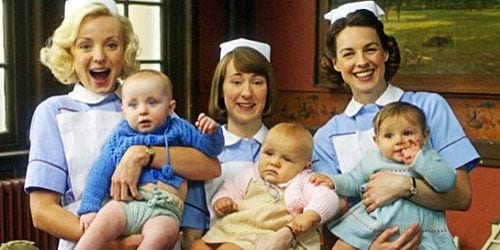
The second season of the BBC’s Call the Midwife is set in 1958, just a year later from the first season. As the series continues, midwifery is, of course, the practice around which it revolves, but the pre-birth and postpartum care of the mothers, as well as their families, is also an integral part of the show. Jenny (Jessica Raine) remains as the narrator of the series, now more confident in her abilities, yet still eager to learn from the nurses and midwives in Nonnatus House.
The season also brings a great deal of change as Chummy (Miranda Hart) and her husband, Peter (Ben Caplan), leave for India, in order to fulfill her call for missionary work. It’s only temporary, but they are gone for the middle part of the season and are greatly missed. Hart quickly became an integral part of the series and her unique perspective was often a welcome source of amusement, as well as poignancy. With her absence, Nonnatus House is short-staffed and in need of a replacement and Jane Sutton (Dorothy Atkinson) arrives to assist as a medical orderly. She is shy and socially awkward, yet eventually comes to be part of the group, almost in spite of herself. Jane is especially intriguing because she doesn’t undergo some huge transformation, rather she gradually opens up, but still retains the core of her character.
Jenny, Trixie (Helen George), and Cynthia (Bryony Hannah) remain close friends and a constant source of support for one another. It’s also nice to see Trixie play a larger role in this season, both professionally and personally. Her story assisting a woman on a Swedish cargo ship brings out Trixie’s superficial and insensitive side (she repeatedly makes comments about the woman’s size and her accommodations), as well as her eventual nonjudgmental help when the circumstances of her pregnancy come to light. It’s a showcase for Trixie that fleshes her out more than any episodes in the previous season.
The excitement and joy of helping to bring a child into the world is always fraught with the possibility of complications. One episode focuses on a baby born with spina bifida, and sheds light on how such cases were often treated at the time. Cynthia, however, is the focus of an episode dealing with the loss of a newborn, making her question her abilities and her decision to go into midwifery in the first place. There’s a terrific sequence in which she is in the midst of a panic attack while riding her bicycle through the busy streets of Poplar and her fear and guilt are palpable.
In addition to the work in Poplar, one episode has Jenny sent to a London hospital to work in a male surgical ward. It’s an immediate contrast to her work amongst so many women in Nonnatus House. While in London, her ability is often called into question by a male surgeon clearly uncomfortable with the idea of women assisting in surgery. Her skills are only appreciated when her friend, Jimmy (George Rainsford), is admitted and misdiagnosed. Jenny’s confidence is initially shaken, but she quickly rises to the occasion and proves herself when most necessary. Nevertheless, her return to Poplar is a welcome one, as she is back among colleagues and patients who respect her. The differences between working in a hospital and as an on-call midwife are striking in formality and expectation.
Aside from the younger nurses and midwives, the nuns who run Nonnatus House are also an important part of the series. In particular, Sister Bernadette (Laura Main) continues to struggle (that was hinted at in the first season) with her devotion to God and her desire for a more traditional life, especially as her romantic feelings for Dr. Patrick Turner (Stephen McGann) grow. Her doubt is complicated by a diagnosis of tuberculosis that sends her away from Nonnatus House to recover. The scenes between Main and Jenny Agutter as Sister Julienne are some of the best in the season, as Sister Bernadette’s finally comes to a decision.
The second to last episode of the season brings the return of Chummy and Peter and she instantly reinfuses the series with Chummy’s singular energy. Equal parts enthusiastically optimistic and self-deprecating, Chummy’s return also marks a more personal stake in midwifery for her fellow midwives, as she is now pregnant. The birth is not without complications and because it is Chummy, the viewer’s level of investment is much higher.
Call the Midwife continues to be a highly enjoyable story about a very specific and underrepresented group of women in a time when their independence and skill was the exception. The ways in which these women exercised their will, both individually and collectively, speaks to the importance of their role in the community. The series conveys the difficulties and triumphs of midwifery without ever veering into melodrama. Rather it presents the job as demanding – often leading the nurses and midwives to sacrifice a great deal of their personal lives for their jobs – yet their work is always worthwhile and rewarding.
The DVD release includes cast and crew interviews that give some background on the unlikely way in which the series came to be, as well as the importance of being true to the period.

![Call for Papers: All Things Reconsidered [MUSIC] May-August 2024](https://www.popmatters.com/wp-content/uploads/2024/04/all-things-reconsidered-call-music-may-2024-720x380.jpg)



